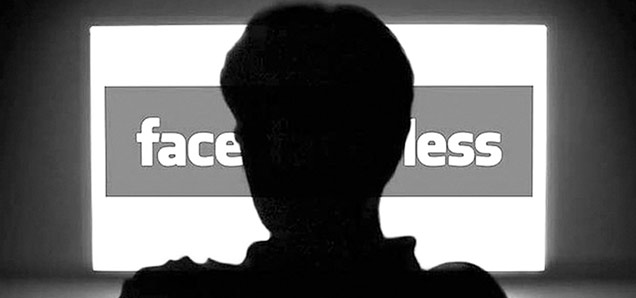The faceless nature of Facebook
 CREDIT: SMH.COM.AU
CREDIT: SMH.COM.AUThe more socially connected you think you are, the less real communication and interactions you have.
Should Facebook be renamed Facelessbook? Oxford defines faceless as “remote and impersonal; anonymous,” but you know exactly whom you are communicating with, or do you? There is a picture next to the text being typed to you, but it isn't the reality of what existed at the moment of communication… it might even be an icon or avatar that is used by countless others.
You could be in the middle of a chat with a man and have no idea if he is sitting ergonomically upright in a three-piece suit or slouched naked on a couch eating potato chips — not a pretty picture.
Far worse is the absence of the subtle but important information relayed in facial expression, the finer details that let you know if someone is really just joking; one forgotten “lol” can send the recipient of a message into tears or a tirade.
In an age when video conferencing is hardly a technological challenge, is it not amazing that even audio is disappearing from our communication.
The telephone was invented in 1876, and since the 1950s, all predictions of science and fiction promised that we would be seeing the person on the other end of the call. Instead, many people sacrifice airtime for bandwidth and could live with their phone if the mic or speaker didn't work, but have a conniption if a keypad button sticks a bit.
According to The Economist, the Public Library of Science attempted to bypass the ambiguous results of previous research on the effects of Facebook through an in depth analysis of 82 Facebook users in their late teens and early twenties. The results revealed a strong tendency for reduced self esteem after heavy Facebook interaction and increased satisfaction with life after “in person” social interaction.
Facebook gained popularity in 2004 when it exploded onto the web as a powerful extension to the social experience, filling a gap left in human interaction for people whose lives were separated from others, whether by place, time or circumstance. But it became a substitute for face-to-face contact, and thus the irony of the name Facebook.
Even when friends are together in the same room, sitting on the same sofa, you can see them with heads bowed, as if posed for some religious ritual, poking away at their touchscreens and keypads. What happened to eye contact? What happened to secret handshakes and high fives? They've given way to emoticons and ROFLs.
It's an awkward moment when you have a long conversation with someone on Facebook, end up sharing something private and intimate, then run into that person at work or school and think to yourself, “OMG... who is this person, really, IDK.”













